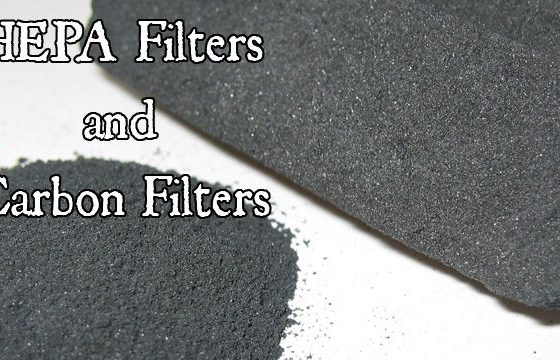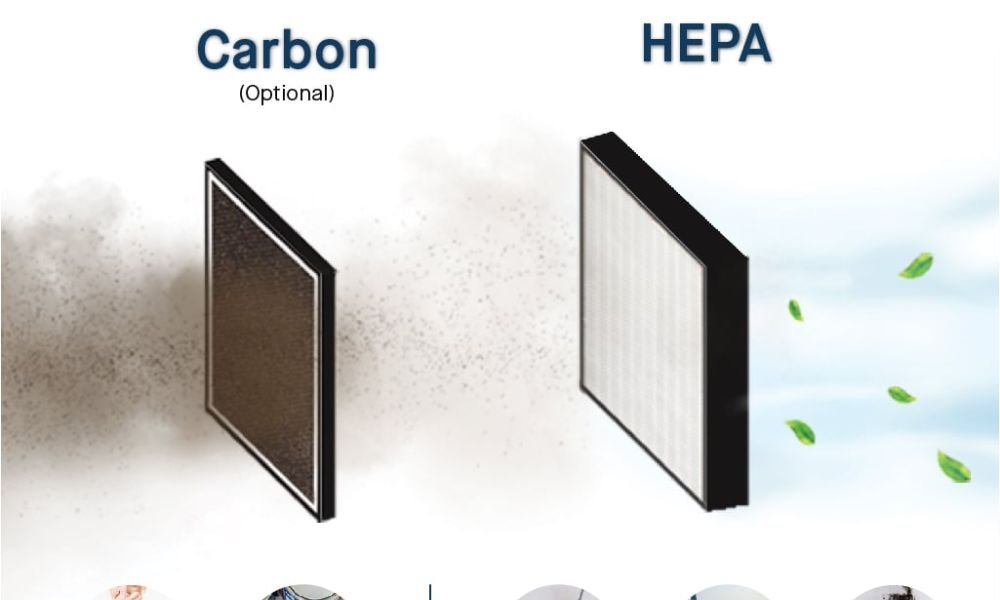Understanding the difference between HEPA and activated carbon filters is key for better air quality. Both filters serve unique purposes in purifying air.
HEPA filters are known for trapping tiny particles. They capture dust, pollen, and pet dander, improving air quality. Activated carbon filters, on the other hand, excel at removing odors and gases. They absorb smoke, chemicals, and unpleasant smells. Choosing the right filter depends on your needs.
Do you need to remove allergens or odors? Knowing the differences can help you make an informed decision. This guide will explore the functions of each filter. By the end, you’ll understand which filter suits your situation best. Stay with us to learn more about HEPA and activated carbon filters.
Introduction To Air Filters
Air filters play a crucial role in maintaining indoor air quality. They help remove contaminants from the air, making it safer to breathe. Different types of air filters serve various purposes.
Understanding the differences between them can help you choose the right one for your needs. This section will introduce you to the basics of air filters and why they are important.
Importance Of Air Quality
Good air quality is essential for health and well-being. Poor air quality can cause allergies, respiratory issues, and other health problems. Clean air can improve sleep, boost immune function, and increase overall comfort.
Using the right air filter can significantly improve indoor air quality. It can remove dust, pollen, smoke, and other pollutants. This makes your home or workspace healthier and more pleasant.
Common Types Of Air Filters
There are several types of air filters, each with unique features. HEPA filters and activated carbon filters are among the most popular.
HEPA filters are known for their high efficiency. They can capture particles as small as 0.3 microns. This makes them ideal for removing allergens and fine dust.
Activated carbon filters use activated carbon to trap gases and odors. They are effective at removing smoke, fumes, and chemicals. Both types of filters have their strengths and are often used together for optimal results.
What Is A Hepa Filter?
A HEPA filter stands for High-Efficiency Particulate Air filter. It is designed to capture particles as small as 0.3 microns. This includes dust, pollen, mold, bacteria, and any airborne particles.
HEPA filters are widely used in air purifiers, vacuum cleaners, and HVAC systems. They help improve air quality and reduce allergens in indoor spaces.
Hepa Filter Composition
HEPA filters are made up of a dense mat of fibers. These fibers are typically composed of fiberglass or synthetic materials. The fibers are randomly arranged and compressed to form a filter mat.
The density and arrangement of the fibers create a maze-like structure. This structure traps and captures tiny particles. The fibers are designed to intercept particles through various mechanisms.
How Hepa Filters Work
HEPA filters use three main mechanisms to capture particles:
- Interception: Particles follow the airflow and get caught on fibers.
- Impaction: Larger particles collide with fibers and stick to them.
- Diffusion: Tiny particles move randomly and get trapped by fibers.
These mechanisms ensure the filter captures a high percentage of particles. The result is cleaner and healthier air in your home or workplace.
What Is An Activated Carbon Filter?
Activated carbon filters are popular for their effective air cleaning. They trap harmful gases, chemicals, and odors. They are often used in air purifiers and HVAC systems.
Activated Carbon Composition
Activated carbon is made from carbon-rich materials. These materials include wood, coal, and coconut shells. They are processed to create a porous structure. The pores increase the surface area, making it more effective at trapping pollutants.
How Activated Carbon Filters Work
Activated carbon filters work through a process called adsorption. Air passes through the filter, and pollutants stick to the carbon surface. This process removes harmful substances from the air. The filtered air then circulates back into the room, cleaner and safer.

Credit: www.iqair.com
Hepa Vs Activated Carbon: Key Differences
Understanding the differences between HEPA and activated carbon filters can help you choose the best air purifier for your needs. These filters serve different purposes and use distinct technologies. Let’s explore their key differences.
Filtration Mechanisms
HEPA filters use a fine mesh to trap particles as air passes through. This mesh captures tiny particles, including dust, pollen, and pet dander. The effectiveness of HEPA filters depends on the mesh’s density.
Activated carbon filters, on the other hand, use a bed of activated carbon. This carbon attracts and holds gas molecules. The process is called adsorption. These filters are great for removing odors and chemical vapors.
Types Of Pollutants Targeted
HEPA filters excel at capturing solid particles. These include allergens, smoke particles, and even some bacteria. They are ideal for those with allergies or asthma.
Activated carbon filters target gaseous pollutants. These include volatile organic compounds (VOCs), smoke, and kitchen odors. They are perfect for improving indoor air quality by removing smells and harmful gases.
Effectiveness In Removing Particles
Understanding the difference between HEPA and activated carbon filters is essential for clean air. Both are common in air purifiers but work differently. Each has unique strengths in removing particles from the air. Let’s dive into their performance.
Hepa Filter Performance
HEPA filters are known for their high efficiency. They can capture particles as small as 0.3 microns. This includes dust, pollen, and pet dander. HEPA stands for High-Efficiency Particulate Air. These filters must meet strict standards. They remove 99.97% of airborne particles.
HEPA filters are ideal for allergy sufferers. They excel at trapping fine particles. This makes indoor air much cleaner. They do not remove gases or odors. Their focus is on particulate matter. HEPA filters are often used in hospitals and cleanrooms.
Activated Carbon Filter Performance
Activated carbon filters are different. They target gases and odors. These filters use a process called adsorption. This means they attract and hold gases and odors. Activated carbon is very porous. This increases its surface area. A larger surface area means better adsorption.
These filters are excellent for removing smoke, chemicals, and VOCs (volatile organic compounds). They do not capture large particles like HEPA filters. Instead, they focus on smells and gases. They complement HEPA filters well.
Choosing the right filter depends on your needs. For particle removal, HEPA is best. For odors and gases, activated carbon is the way to go.

Credit: oransi.com
Applications Of Hepa Filters
HEPA filters are known for their ability to trap 99.97% of particles. They are widely used in various settings to ensure clean air. Below are some common applications of HEPA filters:
Home And Office Use
HEPA filters are popular in homes and offices. They help in improving indoor air quality. These filters are found in:
- Air Purifiers: Removes dust, pollen, and pet dander.
- Vacuum Cleaners: Captures tiny particles during cleaning.
- HVAC Systems: Enhances air quality throughout the building.
Many people with allergies and asthma benefit from HEPA filters. They create a healthier living and working environment.
Medical And Industrial Use
HEPA filters are crucial in medical and industrial settings. They ensure a sterile and contaminant-free environment. Common applications include:
- Hospitals: Used in operating rooms and patient care areas.
- Laboratories: Maintain clean rooms for sensitive experiments.
- Pharmaceutical Manufacturing: Prevents contamination during production.
Industries that deal with hazardous materials rely on HEPA filters. They help in capturing harmful particles and fumes. This ensures the safety of workers and the environment.
Applications Of Activated Carbon Filters
Activated carbon filters have various applications. They are effective in removing impurities from air and water. This section explores two major uses of these filters.
Odor Removal
Activated carbon filters excel at removing odors. They trap odor-causing particles. These filters absorb smoke, pet smells, and cooking odors. This makes them ideal for homes and workplaces. They help keep the air fresh and pleasant.
Chemical And Gas Filtration
Activated carbon filters also filter chemicals and gases. They remove harmful pollutants from the air. Examples include formaldehyde, benzene, and radon. This makes them useful in industrial settings. They improve air quality and protect health.
Choosing The Right Filter
Choosing the right filter can improve your home’s air quality. HEPA and activated carbon filters each have unique benefits. Understanding these can help you make an informed decision.
Considerations For Home Use
For home use, consider the type of pollutants you want to remove. HEPA filters capture small particles like dust, pollen, and pet dander. They are ideal for homes with allergy sufferers. Activated carbon filters remove gases, odors, and smoke. They work well in kitchens or homes with smokers.
Think about the maintenance needs. HEPA filters need regular replacement to stay effective. Activated carbon filters may need less frequent changing. Check the manufacturer’s guidelines for each type. Consider noise levels too. Some filters can be noisy, which may bother you.
Considerations For Specific Needs
If you have specific health needs, choose your filter carefully. For asthma or severe allergies, HEPA filters are excellent. They trap tiny particles that can trigger symptoms. For chemical sensitivities, activated carbon filters are better. They absorb harmful gases and chemicals.
Pets at home can be another consideration. Pet odors and dander can be managed with a combination of both filters. HEPA filters will capture the dander. Activated carbon filters will handle the odors. Choose a filter that matches your specific needs for the best results.
Maintenance And Lifespan
Understanding the maintenance and lifespan of air filters is essential. It helps in keeping your air purifier functioning well. This section compares the maintenance and lifespan of HEPA and Activated Carbon Filters.
Hepa Filter Maintenance
HEPA filters require regular attention. They capture tiny particles, so they clog over time.
- Replace every 6-12 months.
- Check the filter monthly.
- Use a vacuum to clean the outer surface.
HEPA filters are more delicate. Avoid washing them with water. Always follow the manufacturer’s guidelines.
Activated Carbon Filter Maintenance
Activated Carbon Filters are different. They absorb odors and gases. Thus, they need different care.
- Replace every 3-6 months.
- Check for signs of saturation.
- Do not attempt to wash or reuse.
Activated Carbon Filters work well in high-pollution areas. Regular replacement ensures optimal performance.
| Filter Type | Replacement Frequency | Maintenance Tips |
|---|---|---|
| HEPA Filter | 6-12 months | Check monthly, vacuum outer surface |
| Activated Carbon Filter | 3-6 months | Check for saturation, do not wash |
Proper maintenance extends the life of your filters. It also ensures cleaner air in your home.

Credit: www.janitized.com
Frequently Asked Questions
What Is A Hepa Filter?
A HEPA filter captures 99. 97% of particles as small as 0. 3 microns. It is effective for removing dust, pollen, and pet dander.
What Is An Activated Carbon Filter?
An activated carbon filter removes odors, gases, and volatile organic compounds (VOCs) from the air. It uses activated carbon to trap these pollutants.
How Do Hepa And Activated Carbon Filters Differ?
HEPA filters trap particles; activated carbon filters remove gases and odors. They complement each other for comprehensive air purification.
Can Hepa And Activated Carbon Filters Be Used Together?
Yes, combining HEPA and activated carbon filters enhances air purification. This combination addresses both particulate and gaseous pollutants.
Conclusion
Choosing the right filter improves indoor air quality. HEPA filters capture small particles. Activated carbon filters remove odors and gases. Both filters offer unique benefits. Consider your specific needs before deciding. Allergies? Go for HEPA. Odors? Try activated carbon. Clean air is crucial for health.
Make an informed choice. Your lungs will thank you.
Rakib Sarwar is a Registered Pharmacist and a reputed health and wellness blogger. He has a great interest in Air purifiers.
